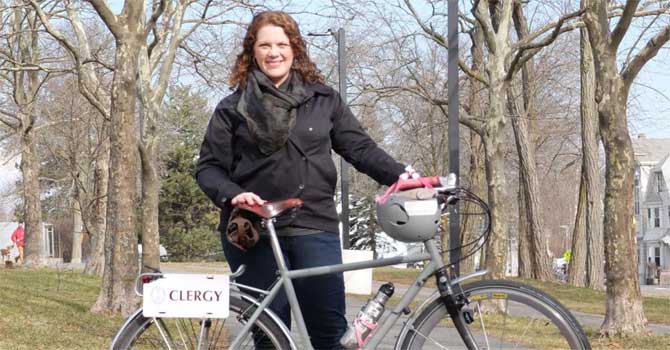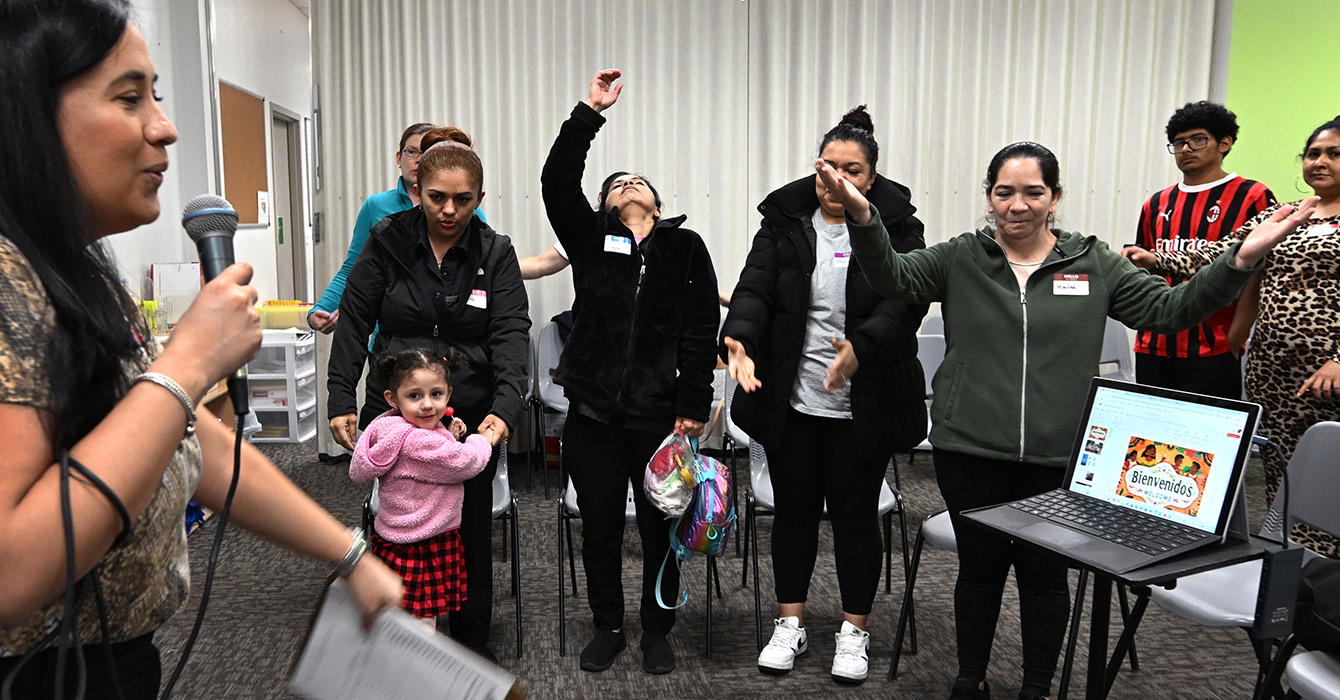Sixteen-year-old Kori Gamble opened the shop door of what was once a vacant storefront on the west side of Greenville, South Carolina.
“Here, let me help you with that,” Gamble said, as an older man rolled in a rusty old Huffy three-speed.
“Sometimes [he] comes in just to visit, with or without his bike, though it does seem to break down a lot,” she said.
Gamble is a youth apprentice at Village Wrench, which is a neighborhood bike shop, community-based ministry, and gathering place in this former cotton and textile mill neighborhood.

In addition to providing workshop space for free bike repairs, Village Wrench offers youth leadership programs for teens such as Gamble. The shop's Earn-a-Bike program allows anyone to receive a bicycle in exchange for community service hours. Village Wrench also sells rehabbed bikes at affordable prices and offers repairs at below-market rates.
The setting for this shop has been struggling since the textile industry began to decline in the 1970s.
Today, the neighborhood is beginning to be gentrified, but it’s still an economically disadvantaged area that, among other issues, lacks good public transportation. The median annual household income in West Greenville hovers around $22,000, and 43% of those households do not have a vehicle, according to data from Village Wrench.
“A lot of our customers … may not be living in the best situation, and bikes are their transportation,” Gamble said. “And bikes aren’t always as sturdy as cars; they need a lot of repair.”

Which means Gamble gets lots of practice. She can now fix a flat, and has learned how to adjust derailleurs and replace brake cables -- handy skills that, in addition to her customer-service experience, could be included on a resume one day.
But it’s not always just about the bike.
“Sometimes [they] just come in to see a friendly face and escape the heat,” Gamble said. “Working here has opened my eyes to see that not everyone has a safe place to go.”
A rising sophomore at the nearby high school, she first got interested in bicycles through a bike club at school, and has been a paid employee at Village Wrench for the last year.
How could you provide safe spaces for people in your community?
She has learned people skills as well as repair skills: “I’ve definitely improved in opening up and talking with people.”
“This job has taught me how important it is to be greeted by a friendly face, and from there you start to build a relationship,” Gamble said.
Matching needs with resources
The fact that an older man who needs a bike repaired and a teenager who likes tinkering with bikes can both find their place at Village Wrench is exactly what its founders had in mind when they first envisioned a neighborhood-based grassroots ministry.
“‘Fix bikes, make friends’ is our motto and how, in simplest terms, we describe what Village Wrench is,” Jessica Compton, the organization’s director, said. “We meet tangible needs with the bike repairs, but it’s equally about people from all backgrounds coming together.”
With this intention of building community and connection, Village Wrench offers more than the typical bike shop. In fact, it almost wasn’t about bikes at all.
The project began in 2013, when a small group laying the groundwork to plant a new Anglican church in West Greenville began looking for ways to get involved in the neighborhood. Wes Whitesell, who works with a Greenville tech firm and lives on the west side, was one of those people.
“We knew we wanted to do something local and helpful. As the ‘seed group’ for our church plant, we were focused on trying to be the hands and feet of Christ,” Whitesell said.
What part of your ministry could be described as “the hands and feet of Christ”?
Given his background in software development, Whitesell thought that computer coding could be the church’s community contribution. The church started by hosting a computer club to teach teens coding skills, but the effort soon fell apart because there weren’t enough skilled volunteers to staff it.
During a period when no one was sure what the next step would be, Whitesell recognized another need that had been hiding in plain sight.
What are the needs that are hiding in plain sight in your community?
“I realized there were always lots of people walking around, but not a lot of bikes. When we moved to the neighborhood 10 years ago, most of our neighbors were single mothers -- I was maybe the only dad on the block, and definitely the only one who rode bikes or had a bicycle pump,” Whitesell said.
He thought perhaps that people had broken bikes they didn’t have a way to repair, so he organized a free neighborhood pop-up bike repair station on a Saturday morning.

For the first one, there were only had one or two customers. But because greater Greenville is a popular cycling town, it was easy to find volunteers with bike mechanic expertise.
People from a church in another part of town asked if they might help, further expanding volunteer capacity. So the volunteers kept showing up, hosting the two-hour Saturday morning bike repair stations, and eventually they attracted more people needing bike repair.
“It’s a matter of matching needs with the right resources and assets,” Compton said.
Computer classes may have been helpful, but the resources weren’t there. Biking in this bike-friendly region, however, was a natural fit, and “reliable transportation is a universal need,” she said.
Whitesell attributes Village Wrench’s early success to the simplicity of its concept.
“We created a low bar of entry for volunteers as well as for neighborhood folks,” he said. “We provide all the tools and training for volunteers, so all they have to do is show up.”
A shade tent propped up in a yard or at a convenient neighborhood spot (the pop-up locations have since expanded to five) makes it easy for people to stop by with bikes in need of TLC. Some volunteers play tunes on boom boxes; others cook hot dogs on a Weber grill.
“Making it fun and festive always helps, too,” he said. “Everybody loves a party.”
Two years after the initial pop-ups, the demand for bike repairs had grown enough for Village Wrench to open a brick-and-mortar bike repair shop. It rents space in a building owned by Mill Community Ministries, a consortium of community development initiatives and social enterprises.
Mill Community Ministries also provides administrative support to Village Wrench (shared copy machines and office supplies, for example) and serves as the non-profit’s fiscal sponsor and provides financial oversight.
For the first few years, though Village Wrench looked more like a for-profit bike shop, the operations were still very much ad hoc. It was open three days a week and was still staffed exclusively by volunteers; Whitesell coordinated everything.
Compton came on as the director and first full-time employee in 2018 and has worked to streamline operations while expanding outreach.

Shifting into a higher gear
In the Village Wrench shop today, the front space is outfitted as a free public repair station with professional bike stands and tools people can use to work on their own bikes with assistance from volunteer mechanics.
In the back of the shop, a part-time master mechanic does more complex repairs for a low fee. Donated bikes get fixed up and are sold to community members at affordable prices. Nearly a quarter of the organization’s operating expenses come from bike sales.
From the beginning, the atmosphere has always been welcoming and inviting and, because of that, other outreach has organically evolved, Whitesell said.
“There were always kids showing up, hanging around the shop, asking me to buy them a bike,” he said. “That didn’t feel right, so I said ‘How about you earn a bike? What if you help us by picking up trash around the neighborhood?’ And that was how our Earn-a-Bike program started.”
Simplicity is the key at Village Wrench, and the Earn-a-Bike program reflects that. People of any age can trade validated community service hours for a safe, reliable, rehabbed bike, complete with a helmet, lock and lights.
Those who log 22 hours or more qualify for a nicer $150 bike; those who only have 6 hours to volunteer can get a $40 bike (all meet baseline quality standards). Village Wrench partners with some community organizations in need of volunteers, but Earn-a-Bike participants aren’t limited to helping them.
“We encourage them to use their talents and ask, ‘What am I good at and how can I put that to work in my neighborhood?’” Whitesell said.
Last year, 19 community members earned bikes through the program, and Compton’s goal is to ramp that up to 120 people a year by 2020.

“It’s going strong and getting more and more popular,” she said. “I think that’s a reachable goal.”
In addition to Earn-a-Bike, in 2016, Village Wrench launched a character-and-bike-building program called 6-Cycle, for students in grades eight through 12.
During the six-week course, teens learn all the basics of bike mechanics by building their own bicycle, step-by-step, from bottom bracket to derailleurs and brakes. Each lesson includes conversations about character traits.
“The 6-Cycle curriculum covers things like grit, self-control, gratitude and optimism, but it’s connected to what they’re doing while they’re getting their hands greasy on the bike, and it’s with their one-on-one mechanic mentor,” Compton said. “The conversations aren’t abstract but very personal and tangible.”
6-Cycle graduates are eligible to become youth apprentices and employees in the shop, furthering their job and leadership training skills. Village Wrench pays slightly more than minimum wage at $8 an hour.

“6-Cycle and Earn-a-Bike are really the heart of who we are and what we do,” she said. “It’s all about investing in our teens and building community leaders, about doing mission locally.”
That includes putting people at ease -- it can be intimidating walking into a bike shop with a real clunker, she said.
What hands-on teaching could you be doing with young adults?
“We make sure we treat all customers and community members with dignity,” she said.
Local and real
During the same time period that Village Wrench was evolving from scrappy pop-ups to a real shop and a more expansive program, Village Church grew from a tiny plant to a young but established congregation. Village Wrench has been part of its ministry from the start.
“Our church motto is, ‘If it’s real, it’s local,’” said the Rev. Seth Cain, the rector at Village Church. “And Village Wrench is definitely real. It’s like a well where all sorts of people gather and foster relationships, in addition to an effort to help those who have a specific need."
“I think of it as embodied altruism -- a hyper-local, really tangible neighborhood way to be rooted in the community. To be the church,” he said.

Cain’s adolescent son participated in the 6-Cycle program, and his family members have purchased all of their bikes from Village Wrench.
“The cool thing is that 6-Cycle enables kids to be shoulder-to-shoulder with kids whose background may be a lot different from theirs,” he said. “That’s what we’re trying to foster.”
Village Wrench also has given Cain invaluable insights that have informed his ministry.
“It’s taught me and our church family how complex poverty is, and how valuable it is to meet immediate needs rather than trying to fix people. We have to keep at it, day after day,” he said, noting that it’s not uncommon for someone who’s just earned a bike to sell it the next week, or have it stolen from them.
“Poverty is hard, life is hard, and I’ve learned we can’t keep doing this work without prayer, without a broader vision of God’s purpose,” Cain said. “Otherwise it will break your heart into a million pieces.”
Community connection
Meanwhile back at the shop, Kori Gamble’s heart is full of pride. Her mother recently celebrated a birthday, and Gamble used part of her Village Wrench earnings to buy her mother a bike.
“I surprised her. My mom never had her own bike, so I wanted to get her one. It made her really happy that her child gave her her own bike,” Gamble said. She hopes they will start riding together.
“That’s the other thing about bikes,” Compton said. They can be more than just reliable transportation for those who can’t afford a car and don’t have access to public transportation.
“We tend to be insular and disconnected, and bikes can open us up to new places and new people. They get us out in the community, bring us together.”
Which was the whole point of the West Greenville church plant team’s initial vision years ago: to nurture community and serve an under-resourced neighborhood in a real, tangible way.
Village Wrench has gotten up to speed on that front, and it’s been a good ride thus far.

Questions to consider
Questions to consider
- Working at Village Wrench opened Gamble’s eyes to the fact that not everyone has a safe place to go. How could you provide safe spaces for people in your community?
- What part of your ministry could be described as “the hands and feet of Christ”?
- Church members’ first attempt to create a computer club failed, but they discovered that with bike repair they could meet a need that was “hiding in plain sight.” What are the needs that are hiding in plain sight in your community?
- 6-Cycle works to strengthen the character of young adults through hands-on mentoring. What hands-on teaching could you be doing with young adults?




















